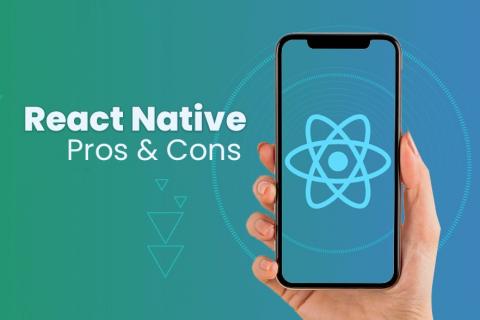Products Catalogs & Keywords:

React Native is a popular framework for building mobile applications using JavaScript. Here are the pros and cons of React Native:
Pros of React Native:
Cross-platform development: React Native allows developers to build mobile apps that can run on both iOS and Android platforms with a single codebase. This saves time and resources compared to developing separate native apps for each platform.
Code reuse: React Native enables code reuse, as a significant portion of the codebase can be shared between platforms. This can lead to faster development cycles and easier maintenance.
Performance: React Native apps have the advantage of near-native performance. The framework utilizes native components and optimizes performance through a bridge that connects the JavaScript code to native APIs, resulting in smooth and responsive user experiences.
Rapid development: React Native provides a hot-reloading feature that allows developers to see the changes in real-time, without the need for recompiling or restarting the app. This speeds up the development process and enables quick iterations.
Large developer community and ecosystem: React Native has a thriving community of developers, which means there are abundant resources, libraries, and tools available. This makes it easier to find solutions, get support, and extend the functionality of your app.
Cons of React Native:
Limited native access: While React Native provides access to many native APIs and components, there may be cases where you need to integrate specific platform features or use platform-specific UI elements. In such cases, you may need to write native code or rely on third-party libraries.
Performance limitations: Although React Native apps can achieve near-native performance, certain complex or highly computation-intensive tasks may still require native development for optimal performance.
Version compatibility: React Native is actively developed and evolves rapidly, which can sometimes lead to compatibility issues between different versions of the framework and its dependencies. This may require additional effort to keep the project up to date and ensure compatibility with the latest features and bug fixes.
UI inconsistencies: While React Native provides a set of UI components that closely resemble native elements, there may still be inconsistencies in the look and feel across different platforms. Customizing the UI to match platform-specific design guidelines may require additional effort.
Learning curve: If you're new to React Native or come from a native development background, there may be a learning curve associated with understanding the framework's concepts, JavaScript development, and the React component-based architecture.
It's important to consider these pros and cons when deciding whether to use React Native for your mobile app development. The suitability of React Native depends on factors such as project requirements, target platforms, performance needs, and the development team's expertise.
Source URL: - https://itechindia.co/us/blog/pros-and-cons-of-react-native-app-development/
